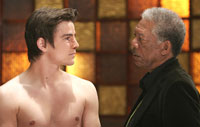First there was Quentin Tarantino, who combined bloody violence and wisecracking humor in his tragic tales of cops gone bad and killers trying to do good. Then there was Guy Ritchie, who made outright comedies in which lots of people died but a happy ending was ensured for the “best” characters. And now there is Lucky Number Slevin, which was directed by neither filmmaker but bears their stamp nonetheless. Like Ritchie, director Paul McGuigan (Gangster No. 1) is a stylish Brit, and like Tarantino, writer Jason Smilovic revels in amusing wordplay; what’s more, several of the actors are Tarantino veterans.
So if you don’t like the sort of crime films that find humor in gangsters and hit men, you almost certainly won’t like Lucky Number Slevin, which begins with several graphic and seemingly unconnected acts of violence—a couple of shootings, a couple of stabbings, a broken neck and a baseball flung across a room and right through a bookie’s bespectacled eye—before settling into a funny tale of mistaken identity. But if you do get a kick out of this sort of film, then you may like Slevin—though the characters are wafer-thin and the plot leaves you with little to digest once the movie’s over, which is probably for the best, since the more you think about it and take it seriously, the more disturbing it does become.

The film unfolds at a brisk pace, and the less you know about it, the more fun you may have being surprised by the plot twists and guessing how they will all fit together. Josh Hartnett stars as Slevin, a man who has just arrived in New York City, when a couple of gangsters come knocking on the door and demanding that he come with them. The two men are looking for someone named Nick Fischer, and since Slevin is staying in Nick’s apartment, the men assume that Slevin is Nick and take him away despite his protests—and despite the fact that he just got out of the shower and is wearing nothing but a towel.
The men take Slevin to see The Boss, who is played, in a nice bit of against-type casting, by Morgan Freeman. The Boss makes his first appearance by stepping portentously down a dark staircase and asking Slevin if he is familiar with “the Shmoo,” a fictitious creature from the Li’l Abner comic strip; and the way Freeman goes on and on about the Shmoo’s habits and properties, you’d think he was narrating another penguin documentary.

But it turns out The Boss has more serious business on his mind. It seems a long-simmering feud between him and a rival crime lord, The Rabbi (Ben Kingsley—sorry, that’s Sir Ben Kingsley, now), is on the verge of turning into an all-out war; and Nick Fischer—or, rather, Slevin, who is mistaken by both sides for the mysteriously absent Nick—is about to become a pawn in their little conflict, whether he likes it or not. And through all this, lurking in the wings, is the even more mysterious hit man Mr. Goodkat (Bruce Willis).
Lucky Number Slevin has some of the trademark elements of a classic film noir: criminals, confused identities, a protagonist seemingly buffeted by fate, and the sort of snappy banter that attracts good actors. (A typical line, delivered by Freeman: “He’s dead. Murdered. Relegated to the past. Shot from an ‘is’ to a ‘was’ before his breakfast.”) But it turns the genre on its head, too. Instead of the femme fatale who tempts the hero and endangers his life, we have Lucy Liu as Lindsey, a perky, talkative neighbor of Nick’s who may be the best thing that ever happened to Slevin; besides finding him romantically attractive, she offers to help him figure out what has happened to Nick, simply because “it’ll be fun!”

More significantly, while most movies in this genre play as tragedy—think of Reservoir Dogs, The Usual Suspects and other films in which the protagonist who tries to accomplish something good is undone by some sort of personal flaw—this one plays, for the most part, as comedy, and not just because it has funny dialogue and amusing images. True, it has elements of tragedy, too, depending on which characters you identify with. But the film never delves into them or their situations deeply enough to produce the sort of catharsis that is the true aim of tragedy; instead, it tries to give us a satisfying ending (indeed, too satisfying) and asks only that we excuse the odd cold-blooded killing here or there.
Some viewers will accept the movie’s tongue-in-cheek superficiality for what it is, and will no more try to justify the killings than they will try to justify a certain character’s rather inexplicable changes of heart, or the tacky ’60s wallpaper designs that seem to cover everybody’s walls. Others will wish the film had maintained its light, comic touch right to the end, instead of bringing everything together in a climax that takes the story in a more serious direction, but then can’t decide just how serious it wants to be. Tarantino’s films work because, underneath all the post-modern pop-culture riffs, there is usually some sort of moral code at work, however fallen it might be. By comparison, Lucky Number Slevin is an unsettling exercise in amorality. But only if you take it remotely seriously.
Talk About It
Discussion starters- Is it wrong to enjoy a movie in which virtually all the characters are, if not criminals themselves, at least complicit in a crime? Are movies about professional killers automatically worse than, say, heist movies?
- Are some forms of cold-blooded killing more acceptable than others—in movie terms, that is? If Han Solo shoots Greedo first, or the captain of Serenity performs a few summary executions, how is that similar or different to what we see in these sorts of films? What difference does a film’s “genre” make to our interpretations of that film?
- When we first meet Mr. Goodkat, he says, “There was a time … ” What does he means by this? Is he acknowledging changes that have taken place over time? Has he changed over time? Do you think this film affirms the idea that change is possible? Does any person change over the course of this movie, or only our perception of that person?
- When debating which James Bond villain was the best, Slevin tells Lindsey, “That’s when the villain’s most effective, when you don’t know what he looks like.” Is this true? If so, why? How effective are this film’s villains, before and after we see them, or before and after we see who they really are?
- Does this film suggest that revenge is a never-ending cycle, or does it suggest that the cycle can, in fact, end?
The Family Corner
For parents to considerLucky Number Slevin is rated R for strong violence, sexuality and language. The violence gets pretty bloody and includes numerous shootings, a few stabbings, and a baseball thrown right through someone’s eye—as seen from the victim’s point of view. Virtually all of the characters are complicit in murder one way or another. There are also a few bed scenes, one of which includes graphic nudity, as well as a smattering of four-letter words; plus, one character makes a disrespectful remark about Jesus and the Virgin Mary.
Photos © Copyright The Weinstein Company
Copyright © 2006 Christianity Today. Click for reprint information.
What Other Critics Are Saying
compiled by Jeffrey Overstreetfrom Film Forum, 04/13/06Revenge. Mistaken identity. Hit men. A beautiful stranger. And a hero with a broken nose. Josh Hartnett stars in Lucky Number Slevin, a hodge-podge of film noir conventions given a stylish twist by director Paul McGuigan (Wicker Park). The supporting cast includes Morgan Freeman, Ben Kingsley, Stanley Tucci, Bruce Willis, and Lucy Liu.
Some viewers will want to steer clear of it because of its focus on the violent and the vengeful. Others will want to avoid it because of excessive, indulgent onscreen bloodshed. And then there will be those who don’t like storytellers who deliberately mislead the audience. Critics are finding all kinds of reasons for moviegoers to steer clear of this one. And yet they’re finding some pleasant surprises as well.
Peter T. Chattaway (Christianity Today Movies) offers a long list of the film’s violent events, just to give you fair warning. “But if you do get a kick out of this sort of film,” he adds, “then you may like Slevin—though the characters are wafer-thin and the plot leaves you with little to digest once the movie’s over, which is probably for the best, since the more you think about it and take it seriously, the more disturbing it does become.”
Harry Forbes (Catholic News Service) praises the performances, and yet he says that the result is “ultimately pretty formulaic underneath the flashy edginess. But it’s the pervasive revenge motif … that precludes recommendation.”
Adam R. Holz (Plugged In) writes, “[M]oviegoers hoping for an engaging story (one that often echoes the suspenseful structure of 1995’s The Usual Suspects) will be forced to sit through buckets of bloodshed and two completely gratuitous—and graphic—sex scenes as well.”
He’s also upset by the message that “revenge is the only possible response to violence.”
Mainstream critics are split over whether the film’s stylish pros outweigh the violent cons.











